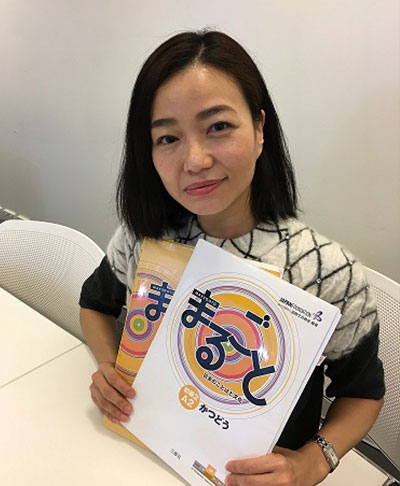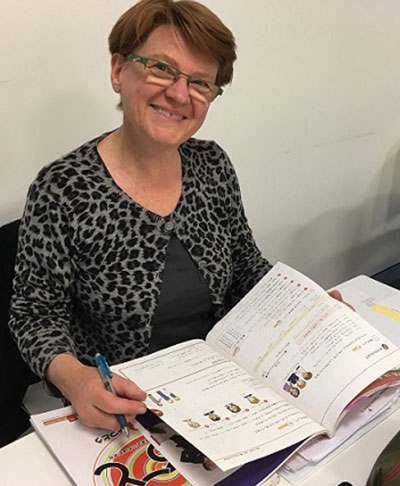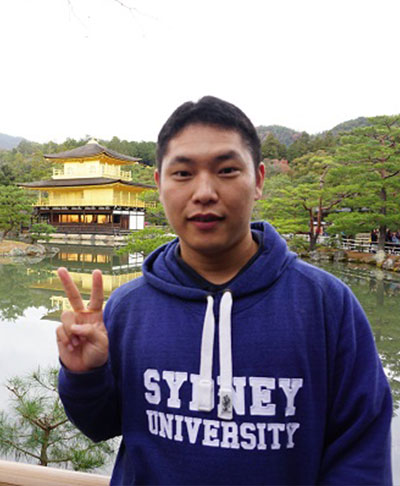- "E-learning websites offer great flexibility in Japanese learning"
- "Now I recognise more spoken language than I used to"
- "I understood the cultural background of the Japanese language through Marugoto"
"E-learning websites offer great flexibility in Japanese learning"
Amy Lam (Sydney, Australia)

Amy has a great interest in learning languages and started learning Japanese as a hobby. She tells us that she was especially attracted by the sound of the Japanese language and kanji. She started learning Japanese on a JF Language Course in Sydney three years ago and now studies using Marugoto Elementary 2 (A2).
-What is your impression of studying Japanese with Marugoto?
Marugoto course books and e-learning websites are great study materials. The textbooks contain a lot of illustrations that make learning fun. With "Marugoto +", I can revise the topic that I have learnt in the classroom and improve my overall listening skills as well. There are lots of flash cards and quizzes to help me practice grammar. I am impressed with the kanji learning system and fun illustrations. By using them, little by little I am becoming able to remember how to write the kanji.
-What do you think are the advantages of Marugoto?
I think Marugoto has many advantages as learning materials and offers great flexibility in Japanese learning. I can review any topics anytime with "Marugoto +", so I don’t miss any lessons even when I’m sick or busy at work. I can also learn in a relaxed manner and the number of times I can try is unlimited. On the website, Japanese life and culture videos teach me a lot beyond the textbook.
-Please let us know what you would like to do in the future using Japanese, if you have such a plan.
I love traveling and it always boosts my creativity. If I know the language, it will help me access Japanese popular culture and traditions in their original form. I can also explore Japan on my own. My travel experience will be much more enjoyable and satisfying if I can communicate with the locals.
「2020年東京オリンピックに行きたいです。 それで、私は今から日本語を一生懸命勉強しています。」 ("I want to go and see the Tokyo Olympics in 2020, so I’m now studying Japanese hard.")
"Now I recognise more spoken language than I used to"
Constance Ellwood (Sydney, Australia)

Constance started studying Japanese because she had many Japanese friends and wanted to be able to spend time with them speaking Japanese. She tells us that she herself is a language teacher and likes the practical approach of Marugoto very much.
-What do you think are the advantages of Marugoto?
I think Marugoto has several advantages.
It is set at a good pace for learners who cannot study Japanese full-time (e.g. for people who are working or studying full-time). For me the pace of study is manageable but still challenging.
The language points (grammar, vocabulary and expressions) are relevant for practical language needs. I recognise more spoken language than I used to. Phrases like "いつでも (itsudemo)" and "けど (kedo)" I had often heard but never understood. None of the other text books I used previously introduced this language. This is something I really like about Marugoto. It means I can hear spoken Japanese and get more of a sense of what is being talked about.
It is well-supported through the website. It is possible to both revise and prepare using the website, as well as do more challenging activities. Also there is not too much work for each chapter so I don't feel overwhelmed. This kind of ongoing work, step-by-step, is so important in language learning.
The textbooks are written mostly in Japanese so we get lots of practice reading hiragana and katakana Japanese.
-What phrases in Japanese do you like best? And Why?
At the moment I like "すぎます (sugimasu)" because it is so useful. I also use "そうね (sone)" a lot – even with friends who don't speak Japanese – because it seems to capture a feeling of gradual understanding better than any English expression.
-Please let us know what you would like to do in the future using Japanese, if you have such a plan.
I want to keep going with my Japanese learning and maybe one day go to study ceramics in a context where I have to use Japanese.
"I understood the cultural background of the Japanese language through Marugoto"
Paul Jo (Sydney, Australia)

Being interested in martial arts, Paul joined a local club and started practicing Iaido. Through this experience he learned related Japanese words and culture. He took a Japanese course at high school to learn more about Japanese society and culture, and now he studies on a JF Language Course in Sydney.
-What is your impression of studying Japanese with Marugoto?
At the beginning I found it difficult to follow because I used to study Japanese through the Australian high school syllabus, but after getting used to Marugoto’s study method, I was able to understand words commonly used by native Japanese people and the emotions associated with each word, expression, intonation pattern and dialect. Though the Australian syllabus for learning Japanese is easier to learn through studying each and every translated word, Marugoto allowed me to understand the deeper meaning behind how you speak or read by explaining it in Japanese and through context. A direct word by word translation may sometimes lead the reader to use Japanese incorrectly, even though the grammar is correct. For example, "愛している (Aishiteiru) " may be translated as "I love you", but due to cultural differences, you cannot use this in Japan to confess your love to someone, to your parents or to your friends with the same feeling as spoken in English.
-Please let us know if you have any stories that demonstrate the results of your study with Marugoto.
After being admitted to the Japanese-Language Program for Outstanding Students of JF Japanese-Language Courses, I was able to visit Japan and interact with the society there. My biggest worry when visiting Japan was the thought of having insufficient knowledge of the Japanese language. When I began communicating with the public, I realized that most of the words and grammar had already been taught back on the JF Language Course through the Marugoto textbook. As I slowly gained confidence in engaging with people, I began to notice words which I had heard during my Japanese class. Thanks to Marugoto, I was able to use common every-day words and thanks to Marugoto’s listening activities, understand how to navigate around the busy Japanese streets.
-Please let us know what you would like to do in the future using Japanese, if you have such a plan.
I would like to explore Japanese society and make many friends speaking their language. Additionally, I hope to work as a medical practitioner in Japan to share technological, cultural and sociological ideas that contribute to the advance of medical technology.
※Japanese-Language program for Outstanding Students of JF Japanese-Language Courses is a program which invites to Japan students with an outstanding record in the Japan Foundation Language Courses. Participants are given an opportunity to deepen their understanding of the language, culture, and society.
